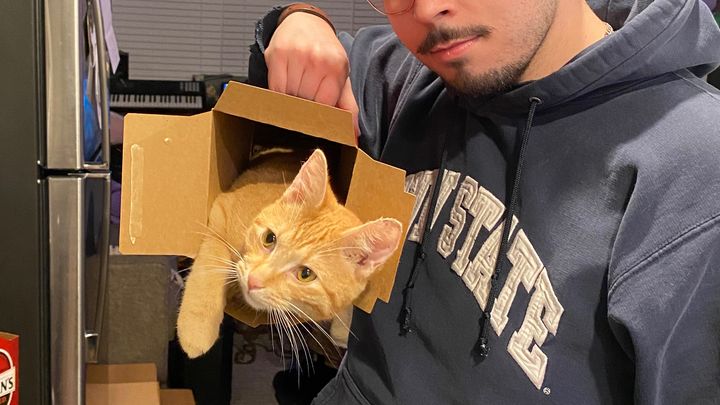
Save Hurley! (FIP Treatment)
Donation protected

Howdy! I'm Corey and I'm fundraising for my little orange dude Hurley! We adopted Hurley in early October from Kentucky Humane Society, and we immediately fell in love, he was not only a perfect cat for us, but a perfect friend for our other cats. All seemed well until late October, when after weeks of lethargy, weight loss, diagnostics, hospitalization, and overall decline, he was finally diagnosed with Dry FIP. Following the diagnosis, we were given the option to give up, or seek very expensive treatment. Ultimately we decided to give the treatment a go and within the first week, Hurley was significantly improving and returning to his normal self. The fight is not over however, and we will have to continue his treatment for 12 weeks, or about 92 days straight. All of this will be very expensive, and my partner and I are full-time college students in our senior year with 3rd shift jobs so, any amount you can provide would help us immensely.

Cost Breakdown
Donations will go directly to treatment, which includes:
- Very expensive medication that must be administered daily and costs up to $24 per day
- Multiple Vet Check ups that cost around $50 without bloodwork
- Skin therapy
- Routine blood work
Vets will need to treat him for anything that may come up while he is vulnerable and make sure his bloodwork is improving while we ensure the health of his skin as he recovers. While we may have caught it soon enough to save him, some symptoms could develop to require treatment. Any leftover donations will go directly to Kentucky Humane Society.
WebMD defines FIP as:
Feline infectious peritonitis (FIP) is a viral disease caused by a feline coronavirus that affects wild and domestic cats. This type of coronavirus is different from the coronavirus that causes COVID-19 in people.
Feline coronavirus is very common and usually doesn't cause any serious issues, aside from mild diarrhea. But when the feline coronavirus changes to a specific strain of the coronavirus, FIP can develop. In about 10% of infected cats, the virus will multiply and mutate, resulting in an infection known as feline infectious peritonitis virus (FIPV) that spreads throughout the cat’s body. It can cause an extreme inflammatory reaction in the tissues surrounding the abdomen, kidney, or brain.
Thank you so much,
Corey McQueen
 Co-organizers (3)
Co-organizers (3)
Corey McQueen
Organizer
New Albany, IN
Alexandria Sisk
Co-organizer
Darcy Hancock
Co-organizer